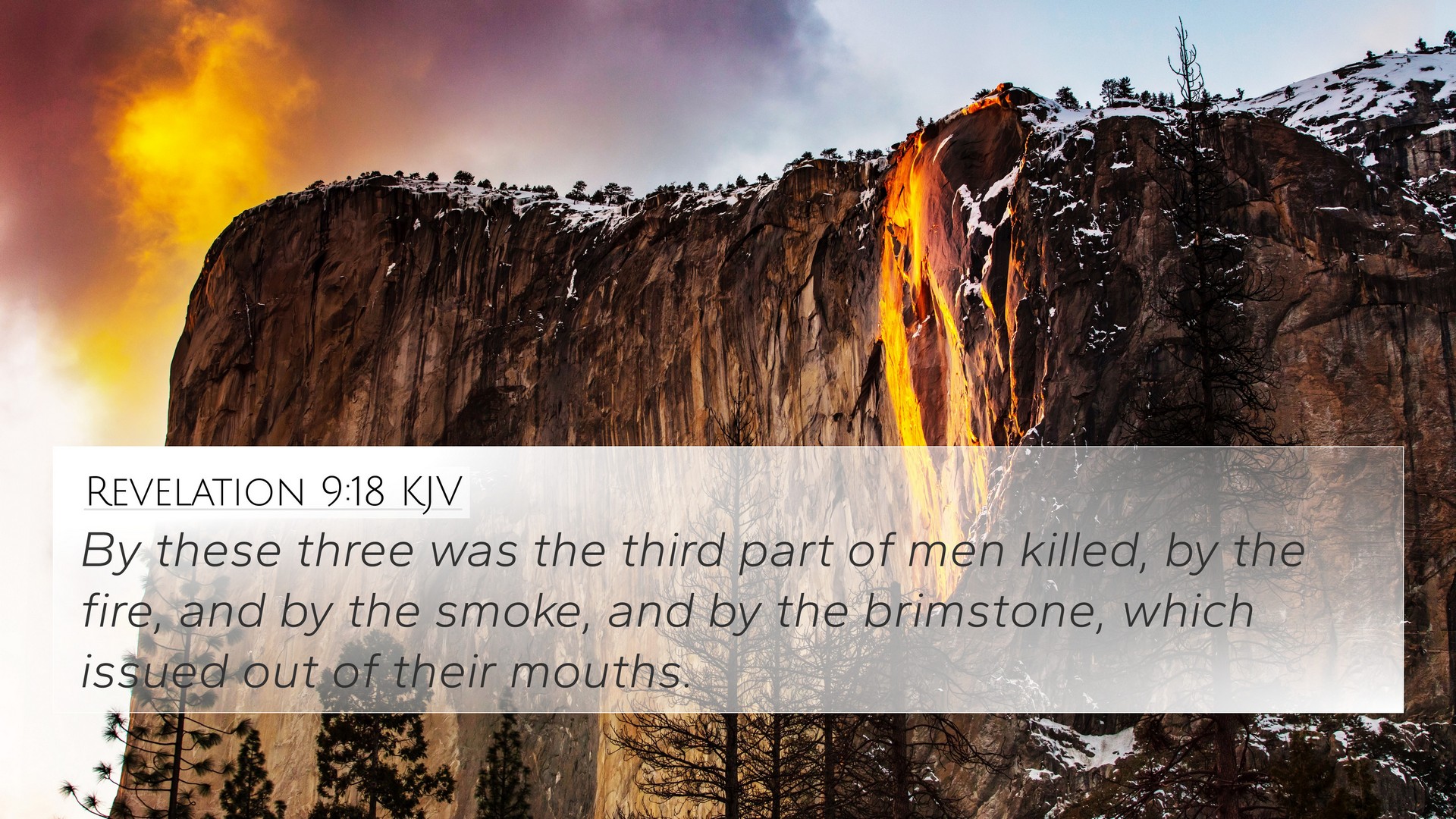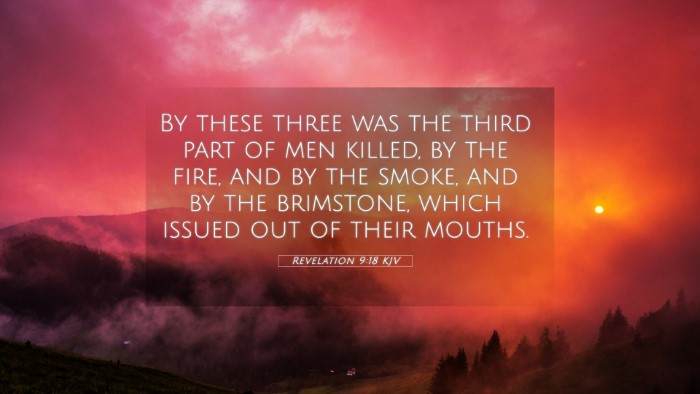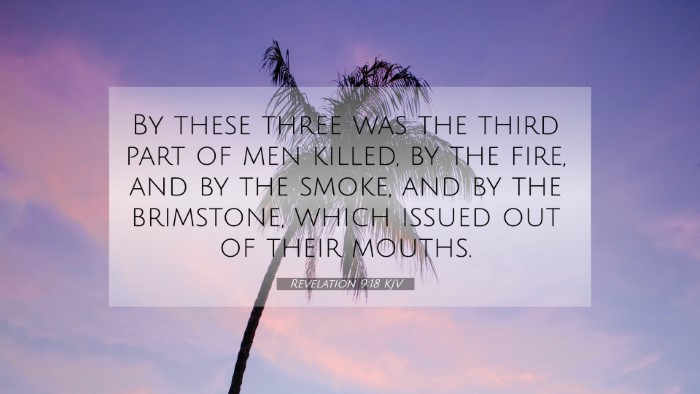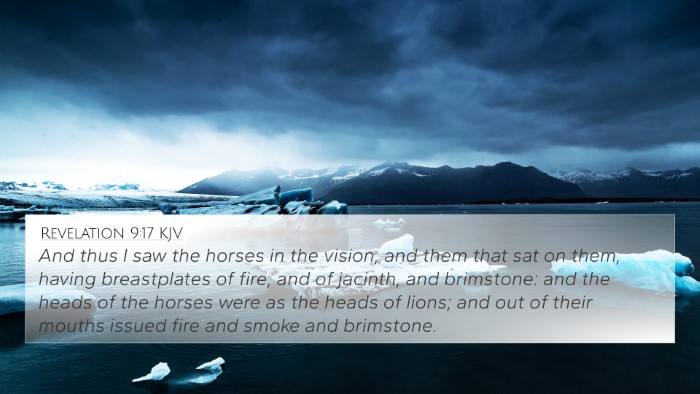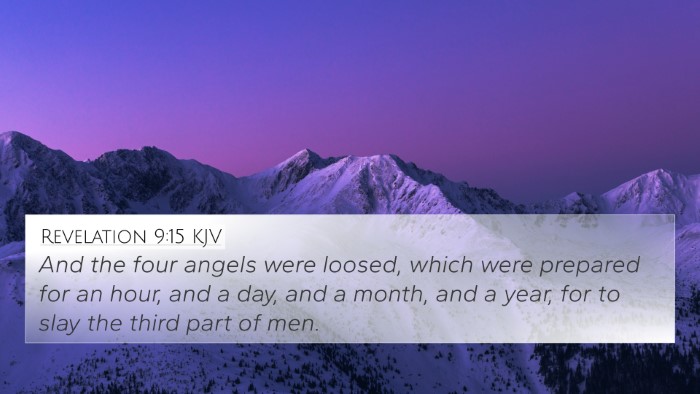Exploring Revelation 9:18
Revelation 9:18 states, "By these three was the third part of men killed, by the fire, and by the smoke, and by the brimstone, which issued out of their mouths." This verse holds profound implications in the apocalyptic context, illustrating God's judgment and the consequences of rebellion against Him. Understanding this verse requires examining the elements that signify divine retribution, as well as connecting it to other biblical passages.
Summary of Insights from Commentaries
Matthew Henry elucidates that this verse speaks of the instruments of God's wrath, emphasizing that the destruction mentioned is a result of divine judgment. Henry notes that these judgments serve as warnings to humanity about the severity of sin and the ultimate consequences. Henry's commentary suggests that this imagery evokes the devastating impact of sin, which can lead to spiritual and physical death.
Albert Barnes elaborates on the symbolic nature of the 'fire, smoke, and brimstone.' He indicates that these elements represent various trials and torments faced by humanity, both in physical and spiritual realms. Barnes points out that the 'third part of men killed' serves as a figure of speech depicting a catastrophic loss, aligning with the overall prophetic theme of Revelation which highlights a cosmic battle between good and evil.
Adam Clarke focuses on the interpretation of these plagues as more than mere historical events; he sees them as symbols of hopelessness and despair that arise from rejecting divine grace. Clarke emphasizes that the imagery serves not just to frighten, but to call people to repentance and acknowledgment of their sinful nature before God. The 'mouths' of these creatures, in his view, symbolize the destructive power of speech when it is not aligned with God's truth.
Connections and Cross-References
Revelation 9:18 resonates with several Biblical themes found throughout scripture. Below are some significant Bible verse cross-references that help illuminate its meaning:
- Exodus 9:18-26 - The plagues of Egypt parallel the destruction mentioned in Revelation, demonstrating God's power in judgment.
- Isaiah 66:15-16 - Similar imagery of fire and judgment emphasizes God's retribution against sin.
- Joel 2:1-2 - The description of the day of the Lord echoes themes of destruction and calls for repentance.
- Romans 6:23 - The theme of death as a consequence of sin is mirrored in the deaths referenced in Revelation.
- 2 Peter 3:7 - This passage discusses the destruction of the ungodly, paralleling the judgment described in Revelation.
- Matthew 24:21-22 - Describes a great tribulation, indicating cosmic turmoil akin to that in Revelation.
- Hebrews 10:26-31 - Warns of the severe consequences awaiting those who reject God's truth, much like the fate of those in Revelation.
Thematic Bible Verse Connections
This verse contributes to broader biblical themes, particularly in the context of divine judgment, repentance, and the ultimate hope for restoration. Thematic connections facilitate a deeper comparative Bible verse analysis that extends our understanding of God's character.
Understanding God's Justice
The striking imagery invokes a sense of awe and fear regarding God's justice and the consequences of estrangement from Him. The connections between Bible verses regarding God’s relentless pursuit of justice versus mercy can be examined through:
- Jeremiah 11:11 - Forewarns of impending disaster due to disobedience.
- Matthew 13:49-50 - The separation of the righteous from the wicked at the end of the age.
- Revelation 21:8 - Lists those who will face the second death, reinforcing the significance of spiritual integrity.
Call to Repentance
The thematic undertone of Revelation 9:18 echoes a call to repentance, similar to various passages throughout the Bible that emphasize God's longing for humanity to turn back to Him. Studies in scriptural cross-referencing highlight:
- Micah 6:8 - Outlines what God requires from His people—justice, mercy, and humility.
- Matthew 3:2 - John the Baptist’s call for repentance parallels the urgency found throughout Revelation.
Conclusion
In summary, Revelation 9:18 serves as a critical reminder of the reality of divine judgment and the urgent need for repentance. Through the examination of cross-references, we recognize the continuity of biblical themes related to God's justice and mercy. This Bible cross-reference guide can assist those studying these concepts, enriching their understanding of how various scriptures interact and reinforce one another. By employing Bible concordance tools and cross-referencing methods, we can explore the interconnectedness of these profound truths within the Biblical narrative.
